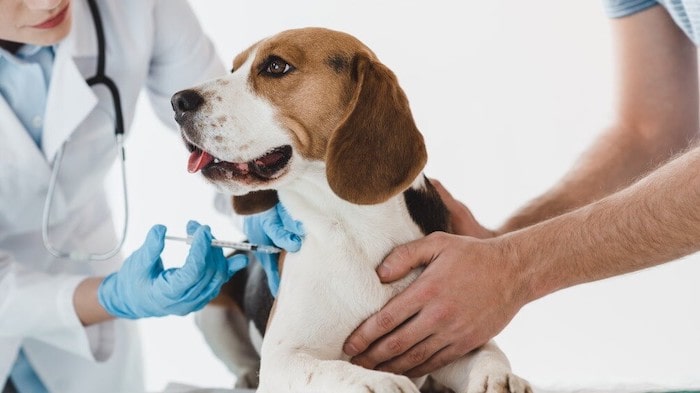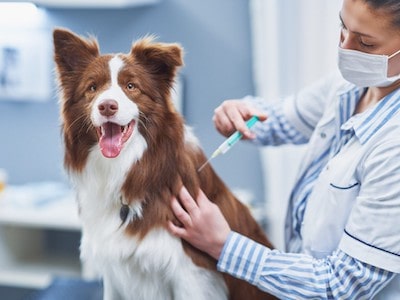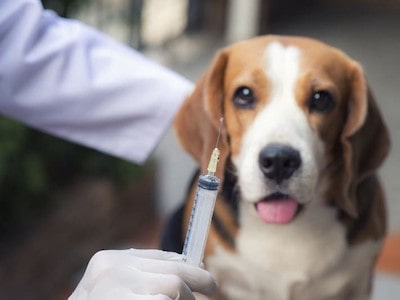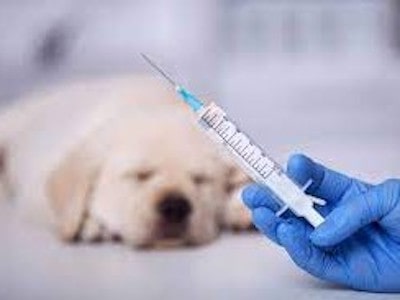Vaccinations play a crucial role in safeguarding the health and well-being of our beloved canine companions. As responsible pet owners, we strive to provide them with the best possible care, and vaccinations are an essential aspect of that care.
One of the key vaccines recommended for dogs is the DHLPP vaccine. In this article, we will explore what the DHLPP vaccine is, its components, and why it is vital for your dog’s health.
By understanding the significance of this vaccine, you can ensure that your furry friend remains protected against a range of diseases. So, let’s delve into the world of DHLPP vaccination and discover why it should be a priority for every dog owner.
What Does DHLPP Stand For?
DHLPP is an acronym that stands for five different medical conditions that this vaccine protects your dog from:
- Distemper: A serious viral disease that affects the respiratory, gastrointestinal, and nervous systems of dogs. It can cause fever, coughing, vomiting, diarrhea, seizures, and even death. It is highly contagious and can spread through the air or by contact with infected fluids. There is no specific treatment for distemper, so prevention is crucial.
- Hepatitis: A liver infection caused by an adenovirus that can cause fever, loss of appetite, vomiting, jaundice, bleeding disorders, and kidney failure. It can also affect the eyes and cause a condition called blue eye. It can spread through contact with infected urine, feces, saliva, or blood. There is no cure for hepatitis, but supportive care can help reduce the symptoms and complications.

- Leptospirosis: A bacterial infection that can affect the kidneys, liver, lungs, and other organs of dogs. It can cause fever, lethargy, vomiting, diarrhea, abdominal pain, jaundice, and breathing difficulties. It can also be transmitted to humans and cause serious illness. It can spread through contact with contaminated water or soil or by exposure to infected animals. It can be treated with antibiotics if diagnosed early.
- Parvovirus: A highly contagious viral disease that causes severe vomiting and bloody diarrhea in dogs. It can also damage the heart and immune system. It can be fatal especially in young puppies. It can spread through contact with infected feces or objects. There is no specific treatment for parvovirus, but supportive care such as fluids and antibiotics can help prevent dehydration and secondary infections.
- Parainfluenza: A respiratory infection caused by a virus that can cause coughing, sneezing, nasal discharge, and fever in dogs. It can also lead to pneumonia or bronchitis in some cases. It can spread through the air or by contact with infected secretions. It can be treated with anti-inflammatory drugs and cough suppressants if needed.
When and How Often Should Dogs Get DHLPP Vaccine?
The DHLPP vaccine is a core vaccine that is recommended for all dogs in the United States. A core vaccine is a vaccine that protects against diseases that are widespread, severe, or transmissible to humans.
The DHLPP vaccine is usually given to puppies as a series of shots starting from 6 to 8 weeks of age and repeated every 3 to 4 weeks until 16 weeks of age. Then a booster shot is given one year later and then every 3 years thereafter.

Some veterinarians may modify this schedule depending on the risk factors of your dog and the prevalence of the diseases in your area. For example, some veterinarians may not include leptospirosis in their routine vaccine or may give it separately as a non-core vaccine. Some veterinarians may also recommend annual boosters instead of triennial ones.
It is important to consult with your veterinarian about the best vaccination schedule for your dog based on their age, health status, lifestyle, and exposure risk.
Benefits and Risks of DHLPP Vaccine
The main benefit of the DHLPP vaccine is that it helps prevent your dog from getting sick or dying from five serious and potentially fatal diseases. By vaccinating your dog, you are also protecting other dogs and humans from getting infected by these diseases.
The risks of the DHLPP vaccine are generally low and outweighed by the benefits. However, like any medical procedure, there may be some side effects or adverse reactions associated with this vaccine.
Some common side effects of the DHLPP vaccine are mild and temporary such as:
- Pain or swelling at the injection site
- Mild fever
- Lethargy
- Loss of appetite
- Sneezing or coughing
These side effects usually resolve within a day or two and do not require any treatment.

Some rare but serious adverse reactions of the DHLPP vaccine are:
- Allergic reaction (anaphylaxis) that can cause difficulty breathing, hives, swelling of the face or throat, vomiting, diarrhea, collapse, or shock
- Immune-mediated hemolytic anemia (IMHA) that can cause destruction of red blood cells leading to anemia
- Immune-mediated thrombocytopenia (ITP) that can cause destruction of platelets leading to bleeding disorders
These adverse reactions require immediate veterinary attention and may be life-threatening.
If you notice any signs of side effects or adverse reactions after your dog gets vaccinated, contact your veterinarian right away.
How Much Does DHLPP Vaccine Cost?
The cost of the DHLPP vaccine may vary depending on several factors such as:

- The location and type of veterinary clinic
- The number and frequency of shots required
- The inclusion or exclusion of leptospirosis
- The addition of other vaccines or services
According to some online sources, the average cost of a single DHLPP shot ranges from $15 to $40. The total cost of a puppy vaccination series may range from $60 to $150. The cost of a booster shot may range from $20 to $50.
These are only rough estimates and may not reflect the actual prices in your area. To get a more accurate quote for your dog’s vaccination needs, contact your local veterinarian.
FAQs
The DHLPP vaccine is crucial for dogs because it provides protection against several highly contagious and potentially life-threatening diseases. By vaccinating your dog, you can significantly reduce the risk of them contracting these illnesses.
In general, most dogs can receive the DHLPP vaccine. However, dogs with certain health conditions or a history of adverse reactions may require modified or alternative vaccination protocols. It is best to consult with your veterinarian to determine the suitability of the vaccine for your dog.
The legal requirements for the DHLPP vaccine vary by region. Some areas may mandate the vaccine for licensing or boarding purposes, while others may have specific regulations for certain diseases covered by the vaccine. It is essential to check with your local authorities or consult your veterinarian for specific information.
The duration of immunity provided by the DHLPP vaccine can vary depending on various factors, including the dog’s age, health status, and exposure risks. Some components of the vaccine may require annual boosters, while others provide protection for several years. Your veterinarian can guide you on the recommended vaccination schedule for your dog.
Conclusion
Prioritizing the health and well-being of our furry companions is an essential responsibility of being a dog owner, and vaccinations are a crucial aspect of that commitment. The DHLPP vaccine stands as a cornerstone in protecting dogs from a range of potentially devastating diseases such as Distemper, Hepatitis, Leptospirosis, Parainfluenza, and Parvovirus.
By ensuring that your dog receives the DHLPP vaccine according to the recommended schedule, you are providing them with the best chance at a long, healthy life.
Remember, the DHLPP vaccine not only protects your dog but also helps prevent the spread of these contagious diseases to other animals in the community.
It may also be a legal requirement in certain areas or necessary for boarding your dog in reputable facilities.

Ellis is a retired veterinary technician and full-time contributor at DogLovesBest. He likes writing about pet health care tips and reviews the products that are useful for fidos on a daily basis.
Ellis also guardians a Siberian husky, Nova, and a cat named Shilly. They all live happily with his wife Ammy, and both the dogs on a seaside apartment in Queens, NY.
